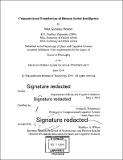Computational foundations of human social intelligence
Author(s)
Kleiman-Weiner, Max
DownloadFull printable version (22.65Mb)
Other Contributors
Massachusetts Institute of Technology. Department of Brain and Cognitive Sciences.
Advisor
Joshua B. Tenenbaum.
Terms of use
Metadata
Show full item recordAbstract
This thesis develops formal computational cognitive models of the social intelligence underlying human cooperation and morality. Human social intelligence is uniquely powerful. We collaborate with others to accomplish together what none of us could do on our own; we share the benefits of collaboration fairly and trust others to do the same. Even young children work and play collaboratively, guided by normative principles, and with a sophistication unparalleled in other animal species. Here, I seek to understand these everyday feats of social intelligence in computational terms. What are the cognitive representations and processes that underlie these abilities and what are their origins? How can we apply these cognitive principles to build machines that have the capacity to understand, learn from, and cooperate with people? The overarching formal framework of this thesis is the integration of individually rational, hierarchical Bayesian models of learning, together with socially rational multi-agent and game-theoretic models of cooperation. I use this framework to probe cognitive questions across three time-scales: evolutionary, developmental, and in the moment. First, I investigate the evolutionary origins of the cognitive structures that enable cooperation and support social learning. I then describe how these structures are used to learn social and moral knowledge rapidly during development, leading to the accumulation of knowledge over generations. Finally I show how this knowledge is used and generalized in the moment, across an infinitude of possible situations. This framework is applied to a variety of cognitively challenging social inferences: determining the intentions of others, distinguishing who is friend or foe, and inferring the reputation of others all from just a single observation of behavior. It also answers how these inferences enable fair and reciprocal cooperation, the computation of moral permissibility, and moral learning. This framework predicts and explains human judgment and behavior measured in large-scale multi-person experiments. Together, these results shine light on how the scale and scope of human social behavior is ultimately grounded in the sophistication of our social intelligence.
Description
Thesis: Ph. D., Massachusetts Institute of Technology, Department of Brain and Cognitive Sciences, 2018. Cataloged from PDF version of thesis. Includes bibliographical references (pages 199-211).
Date issued
2018Department
Massachusetts Institute of Technology. Department of Brain and Cognitive SciencesPublisher
Massachusetts Institute of Technology
Keywords
Brain and Cognitive Sciences.